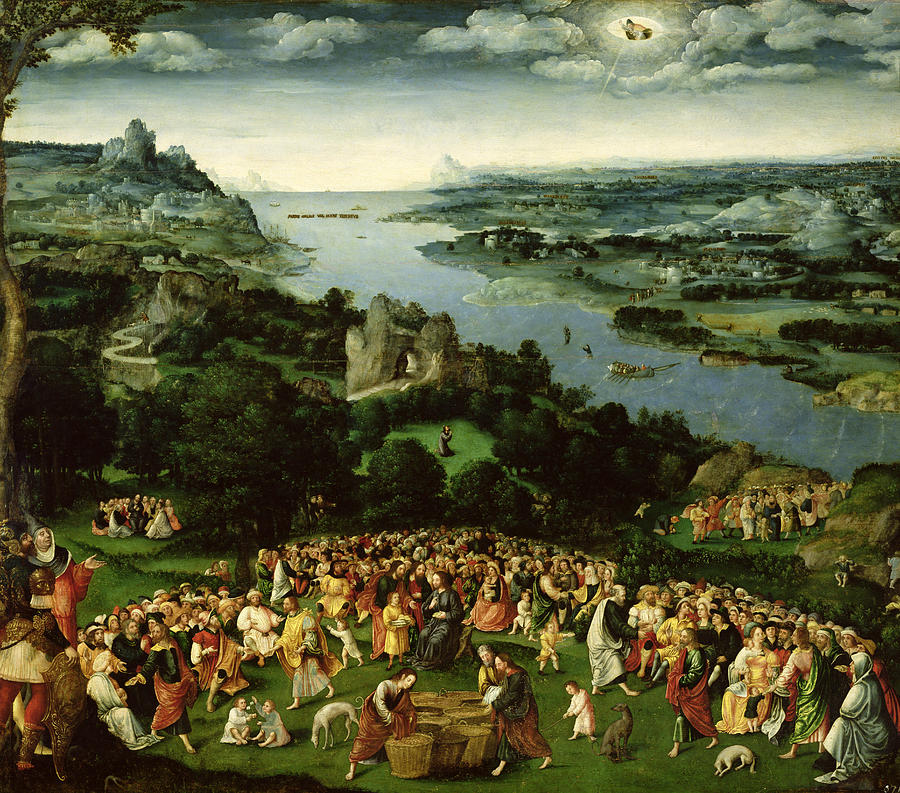The whole post is excellent, but I found William's observation regarding the moral behind the miracle particularly insightful and uplifting (bold and slight editing added by me):
Whatever the mechanics of the miracle, I think the significant thing is that Jesus (in some way) multiplied food provided by one of the members of the crowd -- rather than, say, turning stones into bread (as, according to Matthew, the devil had once tempted him to do) or causing manna to rain down from the sky. The miracle was not a pure deus ex machina, but was an amplification of human effort.
Seeing a crowd of 5,000 hungry people, the lad offered to share his obviously inadequate loaves and fishes, and Philip passed this offer on to Jesus -- and Jesus said, Okay, let's do it. He accepted the paltry offering, gave thanks for it, had the disciples distribute it to the multitude -- and somehow or other (we are not told how, probably because it's not the point), it was enough, enough and to spare.
I think the moral here is that we are to do what we can, offer what we can -- even if it seems laughably inadequate, even if it seems as if it could not possibly have any real effect or "change the world" -- and leave the results to the Lord.
Now ye may suppose that this is foolishness in me; but behold I say unto you, that by small and simple things are great things brought to pass; and small means in many instances doth confound the wise.
And the Lord God doth work by means to bring about his great and eternal purposes; and by very small means the Lord doth confound the wise and bringeth about the salvation of many souls (Alma 37:6-7).
After all, if I didn't believe something like that, why would I even be writing this? Why bother with these notes of mine that are read by a few hundred of the billions of people in the world and probably taken to heart by fewer than that? Why bother doing anything at all, we who are not destined to be movers and shakers? Trying to guess the probably (and probably insignificant) consequences of our actions is a trap. Just do good things and leave the rest to God. That is the moral of the feeding of the five thousand.
I believe William's insight is especially relevant for our time and place. If we can't impact the world as the big movers and shakers do, then why bother doing anything at all? Obscurity and irrelevance are hardly motivating forces. Yet the desire to make it big sorely misses the point. In this time and place we need to focus on doing good things and let God take care of the rest.
Think about it. Nearly every, if not every, contemporary "mover and shaker" out there is, to some degree, actively opposed to God and Creation.
I'll go a step further and add that active opposition to God is a decisive factor in who does and does not become a mover and shaker in today's world. Making it big today means taking the ticket. It really is as simple as that.
The Establishment and its System will happily promote anyone and everyone who chooses to oppose God; and efficiently filter out, ignore, ridicule, or eliminate anyone and everyone who chooses to side with God.
The Establishment and its System want nothing to do with good men. And they certainly do not want any good man to be a mover and a shaker.
So, becoming a mover and a shaker should not be a priority; and it should definitely not be the primary motivation behind anything you are currently doing.
Rather than dream of "making it big", focus your attention on "making it good" and leave the rest to God.
The good things you do every day, however seemingly small and insignificant, may end up having a bigger impact than you could ever imagine, both in this world and in eternity.
An encouraging moral, to say the least.


 RSS Feed
RSS Feed

